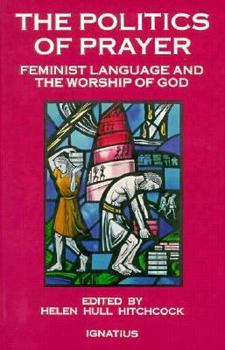Politics of Prayer: Feminist Language and the Worship of God
Select Format
Select Condition 
Book Overview
Feminism and related ideologies have exerted unparalleled influence on organized religion--and on nearly every other aspect of Western culture--for about three decades. Nowhere is evidence of this dominant influence more obvious than in worship of the liberal mainline denominations. The transformation of the language of worship began almost imperceptibly with relatively peripheral liturgical elements, such as prayers incorporating approved feminist language and concepts, and with "corrected" lyrics to existing hymns and words of prayers. Encountering no effective resistance to these achievements, the feminists' objective of radical destruction of "oppressive, patriarchal" religion has now accelerated into an all-out attack on the Scripture and on the core beliefs it incorporates which are common to both Christianity and Judaism--essential beliefs about the nature of God, of the nature of mankind's "imaging" of God, of the meaning of human sexuality and of the relationship of men and women with one another and with God. According to their view, the power of these teachings (the Judeo-Christian "Myth") must be destroyed--and not only destroyed, but replaced with a changeling Myth concocted to conform to their own politically charged notion of reality and presided over by a god (or goddess) of their own construction and which they claim the right to name. So far there has been sparse and ineffective resistance to the relentless undermining of the worship of God. The contributors to this timely and critically important volume include Catholic, Protestant and Jewish believers, men and women, scripture scholars, theologians, translators, linguists, poets, clergy and laity who have in common, in addition to a shared regard for and interest in the integrity of language--an unambiguous affirmation of their religious faith, and a clear-eyed and objective view of the nature of the Cosmic War in which we are all now engaged. These essays offer important insights into the function of language and objectives of translation, as well as penetrating analysis of the effect of ideologically motivated linguistic innovations on new Scripture translations and on the worship of God.
Format:Paperback
Language:English
ISBN:0898704189
ISBN13:9780898704181
Release Date:December 1992
Publisher:Ignatius Press
Length:440 Pages
Weight:1.05 lbs.
Dimensions:0.9" x 5.3" x 8.4"
Customer Reviews
1 rating
Language and Worship
Published by Thriftbooks.com User , 15 years ago
Revolutionaries have always known that the path to power involves using words as well as guns. In Church history, zealous insurgents have routinely sought to re-define words or re-design doctrines. G.K. Chesterton, in The Ball and the Cross, said that "the Church and the heresies always used to fight about words, because they are the only things worth fighting about." Words attach us to realities; fights about words contend for what's priceless: ultimate realities. Such concern prodded Helen Hull Hitchcock to edit a volume of essays, The Politics of Prayer: Feminist Language and the Worship of God (San Francisco: Ignatius Press, c. 1992), which primarily addresses certain feminists' endeavors to change the language of scripture and liturgy in order to change hearers' concept of God and man. According to Naomi Goldenberg, "The feminist movement in Western culture is engaged in the slow execution of Christ and Yahweh," hoping to establish a pantheistic Mother Goddess of some sort in their place. Thus the issue, Hitchcock says, is "objective religious truth" (p. xxi). Radicals, usually espousing some variant of "liberation theology," seek to substitute their own largely subjective "truths" for the deposit of faith preserved by the Church. Tragically, she says, "Feminists (of both sexes) hate the Church, because she represents or in fact personifies, for them, everything which impinges on or limits their 'liberty' to do as they wish. The Church's moral teaching constrains them, accuses them of sin. In effect, they must make the Church become 'sin'" (p. xxiii). To do so, it is necessary to repudiate the past (the traditional Church) and create a more acceptable community, so it is necessary to cast aside the linguistic expressions which shaped it. Of the eighteen essays in the volume I'll focus only on the first. In "Words, Words Everywhere--And Not A Thought to Think," Joyce A. Little emphasizes the importance of language in life. Unfortunately, modernity, with its mathematics and machines, has encouraged the use of increasingly abstract, disembodied words which detach us from life's reality. As Romano Guardini noted, "'man's relations with nature have been altered radically, have become indirect,'" thus losing "'the quality of real experience'" (p. 13). Sufficiently detached from nature, we can fabricate an abstract world which allows us more control, more freedom. Even our own body, as part of nature, comes to be viewed "as rationally understandable and technologically controllable" (p. 13). Consequently, Dr. Little argues, abstract language enables us to reconceptualize reality: "Lust is free love, adultery is open marriage, homosexuality is a life-style, masturbation is safe sex, pregnancy is disease, abortion is termination of that disease, procreation is reproduction, birth prevention is birth control, natural mothers are surrogate mothers, unborn children are embryos, embryos are property, murder is mercy killing, mercy killing is assist





